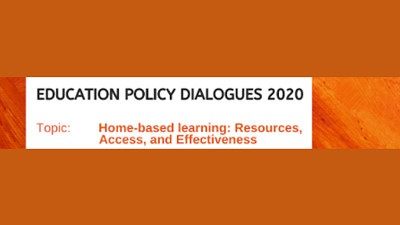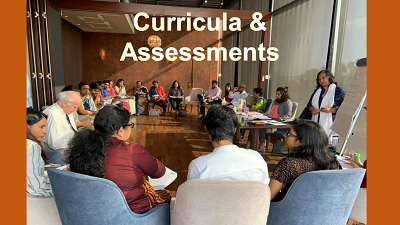As part of the on-going discussions on Home-Based-learning, the EFSL team had an informative discussion with Yarl IT Hub, Mr Balathasan Sayanthan on the innovations introduced through their digital learning platforms and the response from students during this Covid period. The platform has delivered content to large numbers of students for Tech Learning, Advanced level revision as well as for Grade 5 scholarship students. Yarl IT Hub is a not-for-profit social enterprise managed by a group of talented young tech-people, which also collaborates with the Northern Province Education Department on specific projects.

Held on May 2nd, 2020, via Zoom Video: https://www.facebook.com/EduForumLK/videos/726016001268499/ Presentation: The event was attended by 34 participants including teachers from several districts in SL, representatives from the Open University, non-governmental actors in education, private sector representatives, those interested in special education and those from the IT sector. The main purpose of the Dialogue was to exchange ideas, share best practices and discuss successful models used for distance education, e-learning and other forms of HBL systems, during the Covid crisis. With sudden schools closure, teachers had to gear themselves for on-line teaching and other methods of distance education very rapidly.
Zoom Dialogue on “Self-directed learning” in the time of Corona and beyond (In Sinhala) with the participation of the nascent Teachers Forum of EFSL was held on April 17th, 2020.  The EFSL team was joined by Mrs. Yamuna Rathnayake an award-winning ICT teacher (Grades 6-11 ) from Ranabima Royal in Gannoruwa spoke about her experience connecting with students using WhatsApp during this school closure. She described how ‘ Sisu Pawra e-learning’  grouped students into clusters, and how through each cluster leader she was able to share teaching material with all the class students. Students either used their own smartphones and those of their parents or relatives.
In her column why character education is an imperative for Sri Lanka, HGS Premarathna, or Sajitha Preamrathna argues eloquently that good character is more important than ever, and posits, as the title indicates, it should be taught in schools. I have reservations about both arguments. In the first instance, she quotes Andrew Lickona who justifies the need for character education. According to Lickona, “There is a clear and urgent need [for character education]. Young people are increasingly hurting themselves and others and are decreasingly concerned about contributing to the welfare of others.

Held on March 7th, 2020, at the Kingsbury Hotel Presentation: This first Dialogue of EFSL was attended by representatives from the Ministry of Education, the National Institute of Education, National Education Research Centre, university academics, Ministry of Health representatives, Psychologists, Save The Children Sri Lanka and the Institute of Policy Studies. The discussion centered around the Quality of Primary Education, Curricula & Assessments, and whether Sri Lanka is on par globally in regards to primary education quality & delivery. The next session is on March 21st and will focus on teaching-learning processes. Email eduforumlk@gmail.com for details.
Singapore introduced changes to its assessment policy in 2019, lightening the load for school children. https://www.moe.gov.sg/news/press-releases/-learn-for-life—preparing-our-students-to-excel-beyond-exam-results; https://sg.
Education Forum Sri Lanka begins a series of Policy Dialogues in March – 7 & 21 at the Kingsbury Hotel. These forums aim to discuss and collate ideas using experience from local & global Education initiatives. They will bring together researchers, academics, Ministry & NIE representatives, school representatives and those experienced in Education.
On this second International Day of Education, 24 January, the need for significant attention, better focus, and improved investment in education has never been greater. The theme as suggested by UNESCO is – Learning for People, the Planet, Prosperity and Peace. Education is indeed the cornerstone of all the Sustainable Development Goals, and as a signatory to the declaration Sri Lanka too has major responsibility. Moreover we have the responsibility to ensure equitability in good quality education, to modernize curricula & train teachers so that we are geared to face the challenges of the fourth industrial revolution. Sri Lanka needs a novel approach in the delivery of education, a system that’s student-centered and one which will empower young people with new skill-sets and lateral thinking, so that they will be capable of functioning with competence on the global stage.
According to media reports, the government has announced and the Cabinet has approved a Proposal to increase the the number of students in each class from this year. Increasing student numbers from the current 35-40 in popular urban schools, can seriously hamper the learning environment for students and cause anxiety and stress, for teachers. EFSL will publish a Policy Brief on this topic soon. Meanwhile its worth reading the OECD perspective on this, in the link below. https://gpseducation.
With the new decade before us its time to ask if the Sri Lankan education system is ready to meet the FIR (Fourth Industrial Revolution), and its attendant multiple challenges. The World Economic Forum article below explains how education systems in the world are preparing themselves for the FIR.According to the 2017 School Census just about 10% of all schools (total 10,000) offer science education. Even so, the number of students in those 1000 schools is dismally small. Only about 36,500 qualify for Advance Level Science education.
 Held on May 2nd, 2020, via Zoom Video: https://www.facebook.com/EduForumLK/videos/726016001268499/ Presentation: The event was attended by 34 participants including teachers from several districts in SL, representatives from the Open University, non-governmental actors in education, private sector representatives, those interested in special education and those from the IT sector. The main purpose of the Dialogue was to exchange ideas, share best practices and discuss successful models used for distance education, e-learning and other forms of HBL systems, during the Covid crisis. With sudden schools closure, teachers had to gear themselves for on-line teaching and other methods of distance education very rapidly.
Held on May 2nd, 2020, via Zoom Video: https://www.facebook.com/EduForumLK/videos/726016001268499/ Presentation: The event was attended by 34 participants including teachers from several districts in SL, representatives from the Open University, non-governmental actors in education, private sector representatives, those interested in special education and those from the IT sector. The main purpose of the Dialogue was to exchange ideas, share best practices and discuss successful models used for distance education, e-learning and other forms of HBL systems, during the Covid crisis. With sudden schools closure, teachers had to gear themselves for on-line teaching and other methods of distance education very rapidly.  Held on March 7th, 2020, at the Kingsbury Hotel Presentation: This first Dialogue of EFSL was attended by representatives from the Ministry of Education, the National Institute of Education, National Education Research Centre, university academics, Ministry of Health representatives, Psychologists, Save The Children Sri Lanka and the Institute of Policy Studies. The discussion centered around the Quality of Primary Education, Curricula & Assessments, and whether Sri Lanka is on par globally in regards to primary education quality & delivery. The next session is on March 21st and will focus on teaching-learning processes. Email eduforumlk@gmail.com for details.
Held on March 7th, 2020, at the Kingsbury Hotel Presentation: This first Dialogue of EFSL was attended by representatives from the Ministry of Education, the National Institute of Education, National Education Research Centre, university academics, Ministry of Health representatives, Psychologists, Save The Children Sri Lanka and the Institute of Policy Studies. The discussion centered around the Quality of Primary Education, Curricula & Assessments, and whether Sri Lanka is on par globally in regards to primary education quality & delivery. The next session is on March 21st and will focus on teaching-learning processes. Email eduforumlk@gmail.com for details. 